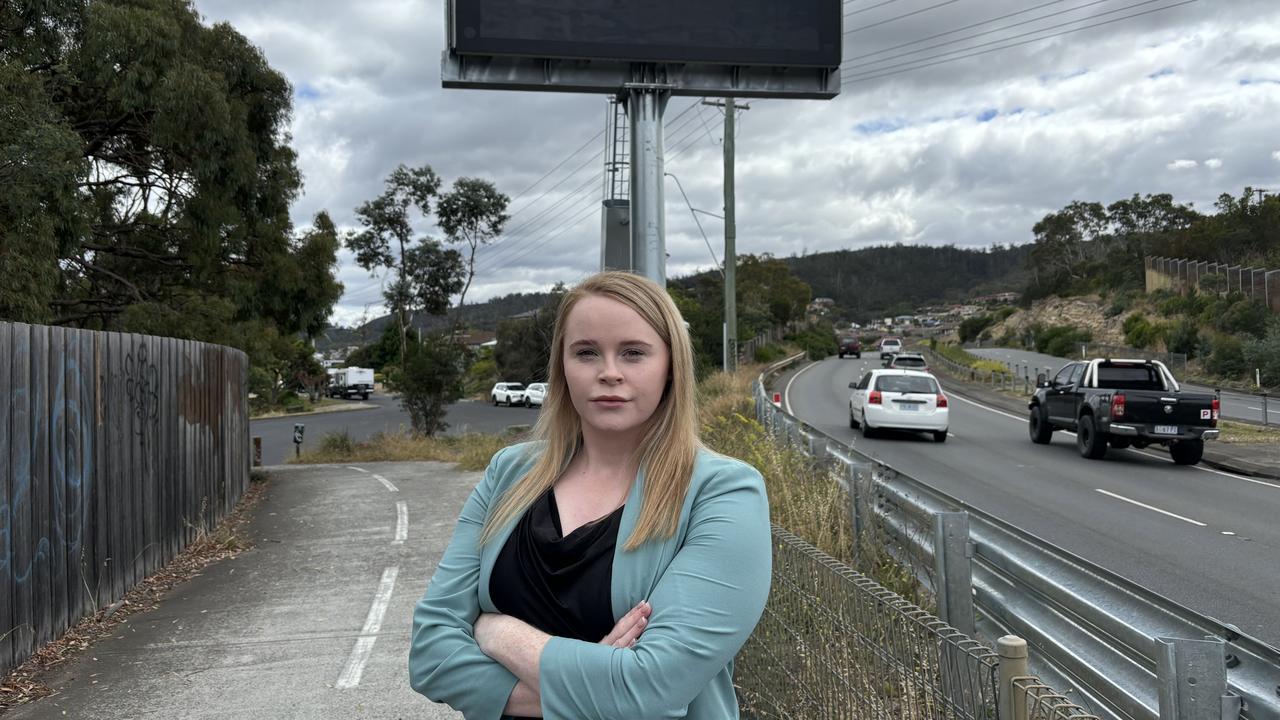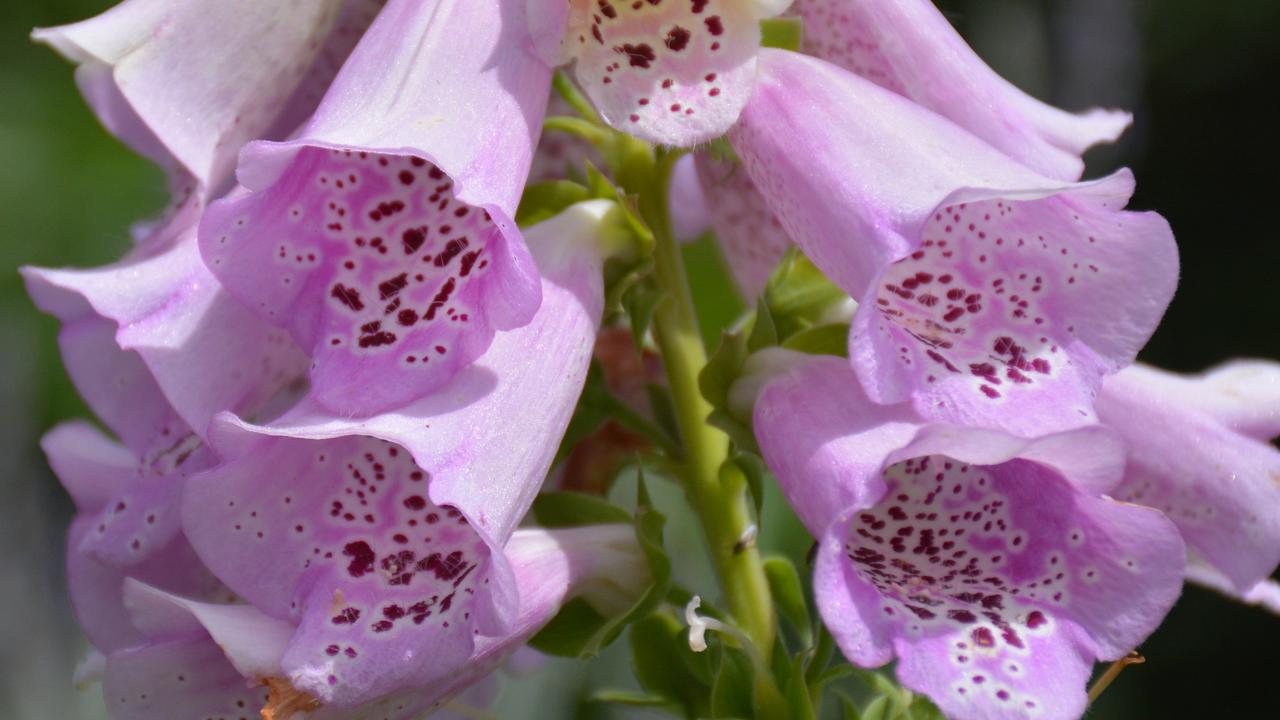A number of whales have died after becoming stranded on a Tassie beach, the remaining will be euthanised
Work is already underway to euthanise the surviving whales stranded on a Tassie beach after attempts to refloat them failed. Here’s the latest.
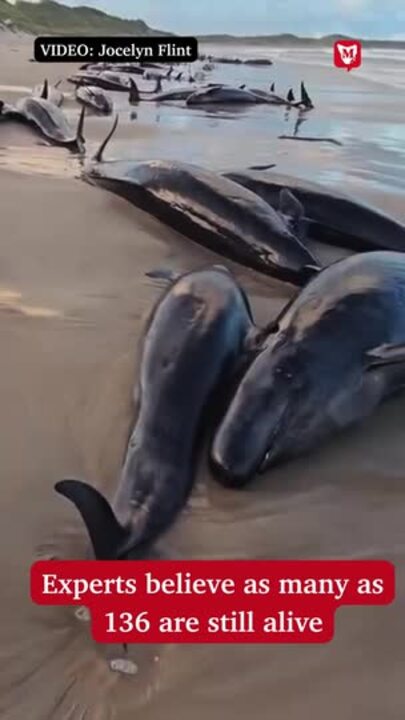
Tasmania
Don't miss out on the headlines from Tasmania. Followed categories will be added to My News.
Update February 20: The remaining surviving whales from mass stranding event on the West Coast will be euthanised on Thursday.
Tasmania Parks and Wildlife Service (PWS) staff euthanised 27 whales on Wednesday.
Brendon Clark from PWS said overnight that 25 whales died of natural causes and that the remaining 38 animals would be euthanised on Thursday.
Following the euthanasia process, Mr Clark said the focus turned to the disposal of the whale carcasses.
“We understand the sensitivities of the area and we continue to work with the local Aboriginal community in determining the best method for carcass disposal,” Mr Clarke said.
“As flagged yesterday, it may be a case of the carcasses remaining in situ on site for the immediate term.”
The mass stranding event saw a pod of 157 false killer whales beached near Arthur River on the state’s West Coast.
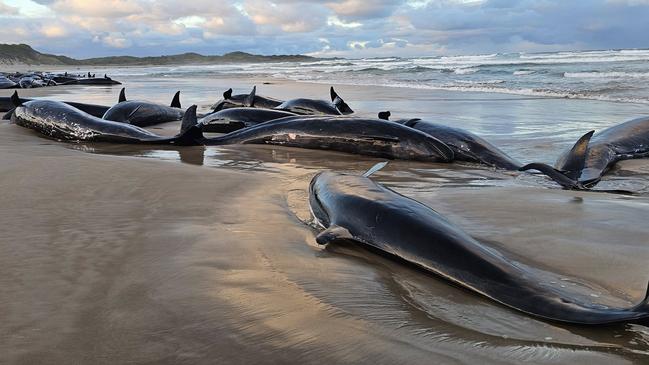
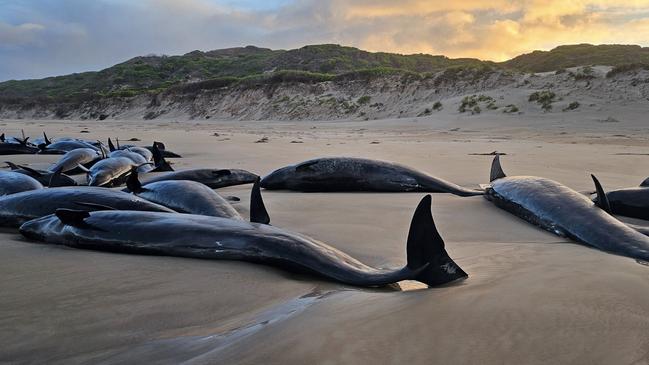
Earlier: Attempts to refloat 90 false killer whales fighting for their lives on a Tasmanian beach has been thwarted by unfavourable weather conditions, expert says.
Incident controller Shelley Graham said there had been a number of attempts to refloat whales — which included a complicated procedure involving relocating the animal to a different, nearby beach.
Sadly, she said the animals continued to become stranded because of the unfavourable weather conditions.
“We relocated two of the animals and attempted to refloat,” she said.
“Unfortunately we were unsuccessful with that as the ocean conditions were preventing the animals from getting out and they were continually restranding.
“The conditions are forecasted to be very similar for the next few days, with a high swell and strong winds.”
Ms Graham said the decision to euthanise the whales via firearm had come as a result of expert wildlife veterinary assessment, with the wellbeing of the animals and staff the “primary concern”.
“It is likely to be the course of action for all 90 whales,” she said.
“It’s quite a remote beach and not suitable for refloating.
“There are around 18 people on site at the moment and this situation brings out an emotional response for all.”
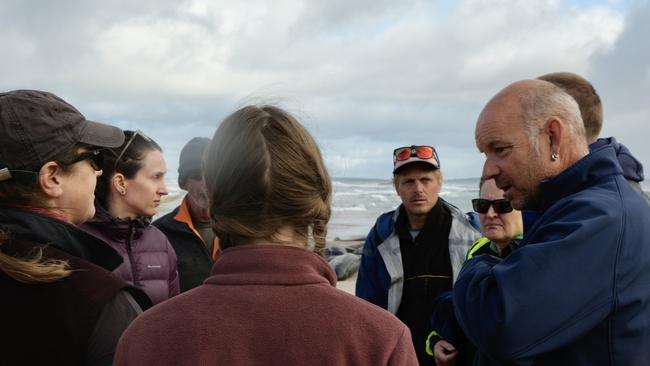
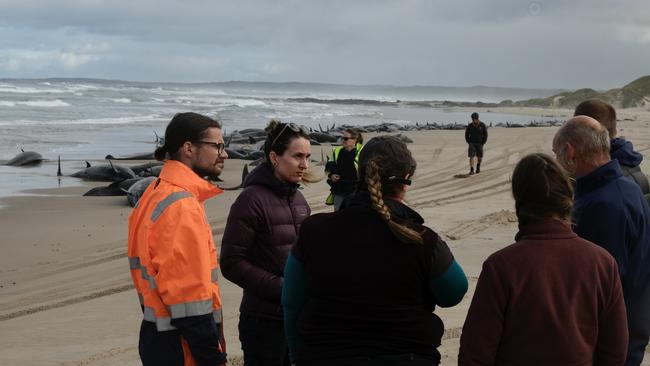
She said it’s likely all 90 whales could be euthanised.
Department of Natural Resources and Environment (NRE Tas) Wildlife Health and Marine Section Head Dr Kris Carlyon said it was still not clear why the whales became stranded.
“The longer they are ashore, the more stressed they become,” he said.
“We still don't know why they came ashore, but on the west coast, the most likely cause is misadventure.
“Euthanasia for a pod of this size and animals this size is not a regular procedure and the management of the area will likely to continue into tomorrow.”
Dr Carlyon said it was the “trickiest location” for a whale stranding he had seen in his 16 years in the role.
157 false killer whales had been stranded on a beach near Arthur River on Tuesday evening, with Ms Graham confirming 90 were still alive at this stage.
10.30am: Vets and marine biologists are at a beach near Arthur River where 157 false killer whales have stranded.
Tasmania Parks and Wildlife’s Brendon Clark updated media on the situation on Wednesday morning.
He said 90 whales were still alive, down from earlier estimates of 136. The whales range from 500kg to 3t.
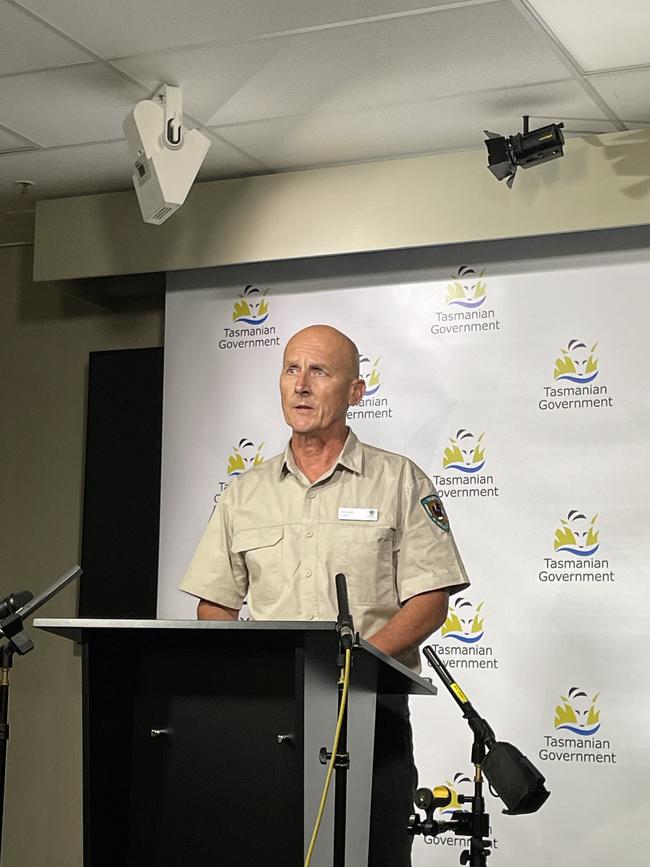
There was no comment on the whales survival rate, however he confirmed euthanizing was an option for animals to minimise suffering.
The public alerted officials to the stranding on Tuesday afternoon, when helicopters — already deployed to survey nearby bushfires — conducted a surveillance of the area.
“There was little we could do with very few crews yesterday afternoon,” Mr Clark said.
He confirmed the inaccessibility of the site and water conditions hindered the use of normal practices for strandings.
“This exposed beach is simply not an option to refloat,” he said.
Salmon farming equipment can be used to assist rescue efforts of stranded whales, and while it’s available, Mr Clark said it was unlikely to get there in a timely manner.
He said they hadn’t determined why the whales had stranded.
While there has been no call-out for community help, Mr Clark said the public were able to pitch in.
It’s believed the last time a mass stranding of this type of whale in Tasmania was 50 years ago, in Stanley in 1974.
More recently, there were mass strandings of pilot whales on the state’s coast in 2020 and 2022.
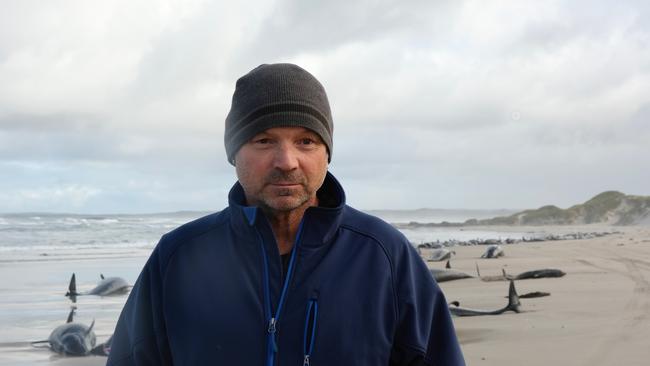
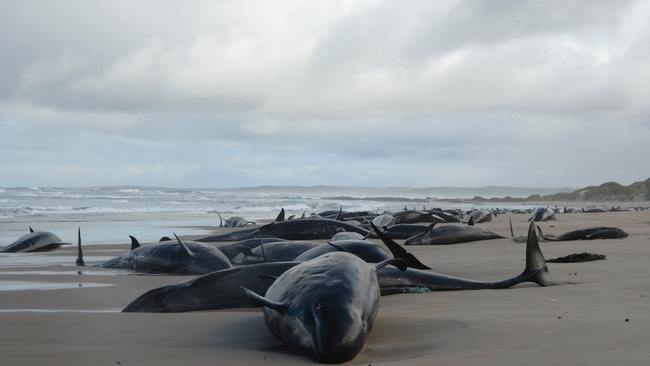
INITIAL: A group of 157 whales have stranded near Arthur River, on the state’s west coast — south of Marrawah.
The Department of Natural Resources and Environment Tasmania confirmed marine conservation experts, including wildlife veterinarians have arrived to the incident.
It’s believed to be a group of false killer whales and initial observations have found 136 animals are still alive, NRE Tas says.
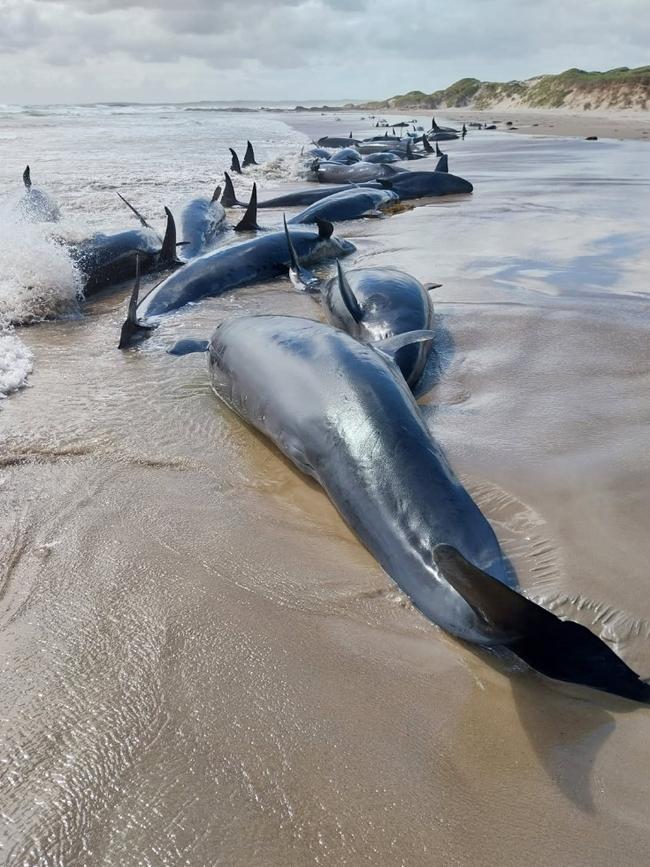
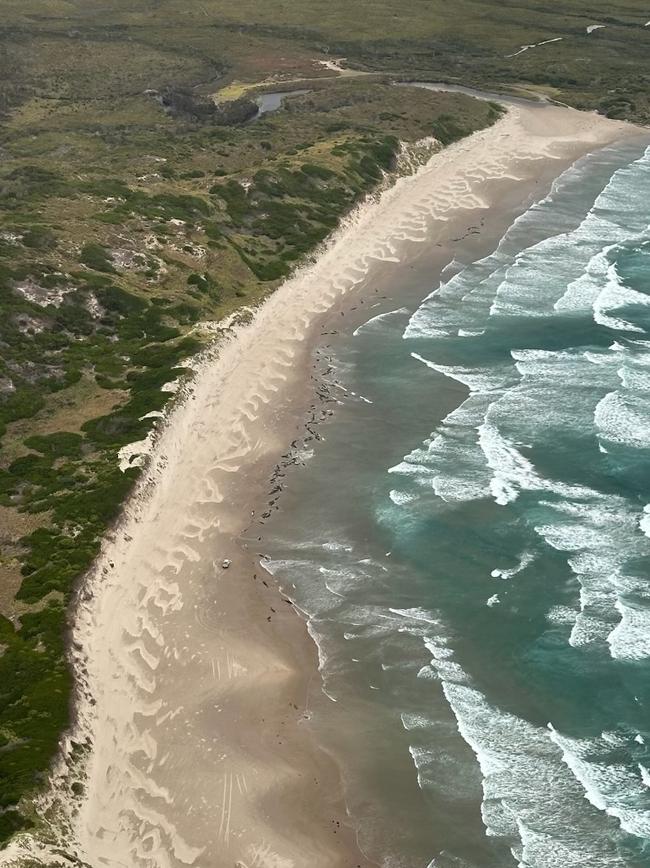
Initial assessments and planning is underway in a joint effort between government agencies and Environment Tasmania’s Marine Conservation Program.
“Stranding response in this area is complex due to the inaccessibility of the site, ocean conditions and the challenges of getting specialist equipment to the remote area,” the NRE spokesperson said.
No call for help from the general public has been made at this stage.
All whales are protected species, even once deceased, and it is an offence to interfere with a carcass.
Arthur River resident Jocelyn Flint said she had been attempting to assist the whales with a friend since 6am.
“I think they’ve come up on the beach yesterday afternoon,” Ms Flint said.
“There’s tape on some of the whales, so it looks like someone has been here, but it’s so shocking to see this many.”
She said her son had come across the pod last night while fishing and raised the alarm with his family.
“It’s such a sad sight, especially with some live whales laying next to some already dead,” she said.
It comes as the fires scatter the west coast and more than 94,000ha of bushland has been destroyed due to the blazes.
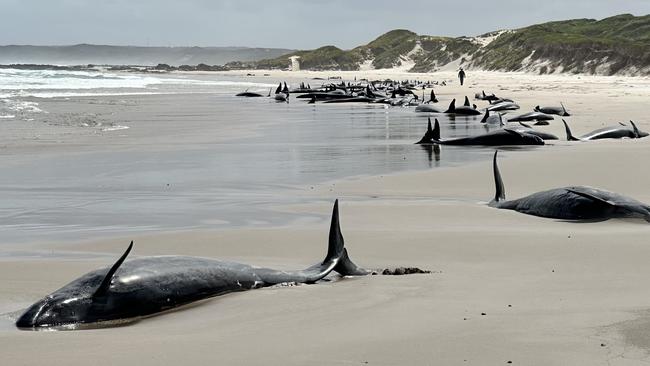
Originally published as A number of whales have died after becoming stranded on a Tassie beach, the remaining will be euthanised

